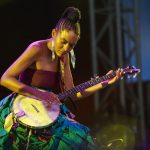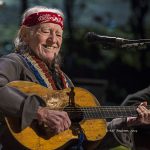I have seen rock and roll past and its name is Buffalo Springfield
The surviving members of the late, great and short-lived Buffalo Springfield performed in concert this weekend for the first time since they broke up in 1969. The occasion for the get together was Neil Young’s annual Bridge School Benefit concert, a two day event at the Shoreline Amphitheater in Mountainview, Ca. I attended Saturday’s show.
The reunion of Young’s former band was the headline attraction and it was bittersweet. You were left agog at the thought of what might have been had they stuck around instead of disintegrating after three albums and barely two years together. Seeing them live and in such great voice made me realize what a huge vacuum they left and what a shame it was that other, vastly inferior hooks-and-harmony guitar bands (who said anything about the Eagles?) came along and commandeered their audience.
The setting was beautiful, an outdoor amphitheater clad in mists that drifted in from San Francisco Bay; on a raised platform at the back of the stage were Bridge School students and alumni, young people confined to their wheel chairs by Cerebral Palsy (among them was Neil and Peggy Young’s son) and attended by their doting parents – truly a striking and moving tableau. It rained off and on throughout the concert and that seemed fitting somehow.
Neil opened the show at 5 p.m. with solo performances of “Sugar Mountain” and “Comes A Time”; he wore his signature flannel shirt and a brown fedora a size or two too small; he hulked at the microphone, looking a bit grizzled but not bad for a guy pushing 65 and recovering from brain surgery.
When he returned with Springfield hours later in a crisp white hat and fringed buckskin mountain man jacket, the effect was startling. And so was the music. Young, Stephen Stills and Richie Furay (fellow founding Buffalo Springfield members Dewey Martin and Bruce Palmer are deceased; sometime contributor Jim Messina was absent) were preceded on stage by Pearl Jam. After 40 minutes of that band’s turgid grinding (despite Eddie Vedder’s best efforts, every song save “Last Kiss,” a request from one of the wheel chair bound kids on stage, sounded the same) their elders’ spring-loaded melodies and ringing harmonies were electrifying.
Although Stills seemed to labor throughout, croaking his vocals, blowing a guitar solo and looking in his rumpled suit coat like an off duty cop on stage next to his rockin’ cowboy bandmates, he rose to the occasion nicely for his two big numbers, “For What It’s Worth” and “Bluebird.”
Young was his usual mighty self, delivering vocals in his patented style (who knows how he manages to sound heartbreakingly plaintive and ass-kicking aggressive at the same time on “Mr. Soul,” “Broken Arrow” and “Burned”), stalking the stage looking for guitar fights and in general owning the show.
But Springfield’s secret weapon was Richie Furay – he sang lead on most of the songs and looked younger and more vigorous than his weathered mates. A friend tells me that Furay found the Lord way back in 1970 and has worked the Christian rock circuit since his post-Springfield band, Poco went kaput. These days he is pastor of a church somewhere out in Colorado. If so, there’s nothing pious or constrained about his singing and guitar playing. Flanked by Stills and Young, who contentedly contributed Glee-worthy “oo oo ooo” backing vocals, Furay shined on a sadly forgotten string of sparkling Springfield gems: “On the Way Home,” “A Child’s Claim to Fame,” “Go and Say Goodbye,” “Nowadays Clancy Can’t Even Sing,” “Kind Woman” and “Do I Have To Come Right Out and Say It.”
Other highlights of the evening:
Jackson Browne was in fine voice with stringed-instrument maestro David Lindley accompanying; sorry I laughed when I overheard a guy say “Too bad his last big hit was Daryl Hannah – harr!”.
Lucinda Williams was at her slurring, fallen angel best singing a blues meditation on what it’s like to be a motherless child on Mother’s Day, a lament doubtless shared by many, if not most of her contemporaries, on stage as well as off.
Elvis Costello opened his set solo with a cover of his host’s own lament, “Tell Me Why,” before Emmy Lou Harris joined him to duet on the haunting tune she used to sing with its composer, Gram Parsons, “Love Hurts.” Elvis was in fine fettle, mining tunes from his Almost Blue period and sporting a new svelte look; fans may be pleased to know he no longer looms large as a lorry.
Kris Kristofferson was Bad Blake with better songs. He whispered Janis Joplin’s name during the closing verse of “Me and Bobby McGee,” his ode to their lost love. And his hymn of degradation, “Sunday Morning Coming Down,” sounded like it was sung by a sinner who had finally freed himself from the grip of the sorrows and the vices he sings about. If so, fans suspected he may have stepped off the wagon for a moment back stage because when Elvis brought him back out and introduced him as a co-author of a song the two wrote with Roseanne Cash, Kristofferson appeared to forget his own words.
The night’s big surprise was supplied by none other than Billy Idol. He and his band, led by the same guitarist who accompanied him in his MTV heyday, Steve Stevens, delivered a blistering set that roused the rain soaked crowd to its feet. When Costello, an early avatar of punk, followed and offered his acolyte a shout out — “Billy was great wasn’t he!” — it was the voice of authenticity singing the praises of a guy who always seemed like a hoax but proved that night to be something more.




